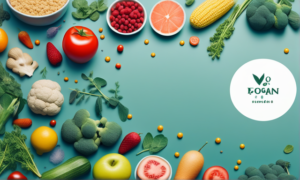 Benefits of a Vegan Diet - 6 Science-Based Health Advantages of Vegan Eating
A vegan diet offers a range of health benefits. For those looking to lose weight, a vegan diet can be helpful. Veganism also contributes to maintaining heart health. Moreover, this diet may provide protection against certain types of type 2 diabetes and other cancers.
Benefits of a Vegan DietHere are the potential benefits of a vegan diet, along with some versatile plant-based whole-food recipes. We'll also explore the differences between vegetarian and vegan diets.
Transitioning from a typical Western diet to a vegan diet means eliminating meat and animal products. This shift will make you rely more on other foods. In a fully vegan diet, alternatives include:
Whole grains
Fruits
Vegetables
Legumes
Peas
Nuts
Seeds
As these foods make up a larger proportion of a vegan diet compared to a typical Western diet, they can lead to higher daily intake of certain beneficial nutrients. Vegan diets tend to provide more fiber, antioxidants, and beneficial plant compounds. They also appear to be rich in potassium, magnesium, folate, and vitamins A, C, and E.
The iron content in a vegan diet is even higher. However, the form of iron provided by plants lacks the bioavailability found in animal foods – meaning your body cannot absorb it. Nevertheless, not all vegan diets are created equal.
For instance, poorly planned vegan diets may fail to provide sufficient amounts of vitamin B12, niacin, riboflavin (vitamin B2), vitamin D, calcium, iodine, selenium, or zinc. This is why choosing a variety of plant-based foods and fortified products is crucial. Supplementation of nutrients like vitamin B12, D, zinc, and calcium may be necessary due to potential deficiencies in a vegan diet.
Vegan Eating Can Aid Weight LossMore and more people are turning to plant-based diets in hopes of shedding excess weight. While it's not guaranteed that a vegan diet will lead to weight loss, there are compelling reasons to give it a try.
Several observational studies suggest that, compared to non-vegetarians, vegans are often leaner with lower body mass index (BMI). Vegan diets are more effective at reducing body weight compared to their counterparts.
Survey results include:
People on a low-fat, high-fiber vegan diet lost more weight than those on a traditional low-fat diet.
Those following a vegan diet lost an average of 6 kg in 16 weeks, while participants following a Mediterranean diet saw no weight loss.
Weight loss among vegetarians was similar to that of vegans. Both groups lost more weight than those on a standard Western diet in a 16-week comparison of low-fat, whole-food vegan and standard omnivorous diets.
Overall, understanding which aspects of a vegan diet play the most significant role in weight loss is crucial. Factors such as fiber content, calorie levels, and the consumption of whole foods versus processed foods all influence the effectiveness of a weight loss diet.
Vegan Diet Appears to Lower Blood Sugar Levels and Improve Kidney FunctionA vegan diet may also be beneficial for type 2 diabetes and kidney function. In fact, vegetarians often have lower blood sugar levels and higher insulin sensitivity, reducing the risk of type 2 diabetes. Even if you're not entirely vegan, increasing the intake of healthy plant-based foods while reducing meat and dairy consumption may lower your risk of type 2 diabetes.
Reducing the Risk of Diabetes ComplicationsIn general, a vegan diet is considered to lower the risk of complications in individuals with type 2 diabetes. Diabetes patients who replace meat with plant-based proteins may reduce the risk of impaired kidney function. More importantly, a vegan diet may help alleviate the pain caused by peripheral neuropathy, a common condition in diabetes patients.
Adopting a Vegan Lifestyle Can Prevent Certain CancersAccording to data from the World Health Organization, at least one-third of cancers can be prevented through factors you can control, including diet.
Benefits of Eating More Plant-Based FoodsVegetarians typically eat more beans, fruits, and vegetables than non-vegetarians. This may explain why vegetarians may benefit from a 15% lower risk of developing cancer.
For example, regular consumption of legumes may reduce the risk of colorectal cancer by 9-18%. Eating more plant-based foods can lower the risk of various cancers, including stomach, lung, oral, and throat cancers. It can also reduce the risk of colorectal, prostate, and pancreatic cancers. Importantly, a vegan diet usually contains more soy products, which may provide some protection against breast cancer.
Avoiding the Benefits of Meat ConsumptionAvoiding certain animal products may also help lower the risk of prostate, breast, stomach, and colorectal cancers. Red meat, processed or smoked meats, and meats cooked at high temperatures are believed to promote certain types of cancer. Since a vegan diet excludes meat, vegans do not consume these foods, reducing their cancer risk.
Avoiding the Impact of Dairy ProductsVegetarians also avoid consuming dairy products, and research suggests that dairy consumption may slightly increase the risk of prostate cancer. On the other hand, there is evidence suggesting that dairy products may help lower the risk of other cancers, such as colorectal cancer.
Therefore, avoiding dairy may not be a factor in reducing the overall cancer risk for vegetarians. It is essential to note that these studies are observational and cannot pinpoint the exact reasons for the lower cancer risk among vegetarians.
However, a sensible approach is to focus on increasing your daily intake of fresh fruits, vegetables, and legumes while avoiding processed, smoked, and overcooked meats.
Vegan Diet and Reduced Risk of Heart DiseaseConsuming fresh fruits, vegetables, legumes, and fiber is associated with a reduced risk of heart disease. Well-planned vegan diets usually include all these foods in higher amounts than standard Western diets.
Observational studies comparing vegans, vegetarians, and non-vegetarians report that vegans have a 75% lower risk of developing hypertension. Vegans may also have a lower risk of dying from heart disease. Vegan diets are more effective than their compared diets at reducing blood sugar, low-density lipoprotein (bad) cholesterol, and total cholesterol levels.
This may be particularly beneficial for heart health, as lowering high blood pressure, cholesterol, and blood sugar levels can reduce the risk of heart disease by up to 46%. A balanced vegan diet includes plenty of whole grains and nuts, both of which are beneficial for your heart.
Vegan Diet May Alleviate Arthritis-Related PainA vegan diet has positive effects on people with different types of arthritis. Individuals with arthritis who either continue on an omnivorous diet or switch to a whole-food, plant-based vegan diet for six weeks report higher energy levels and improved overall function. A vegan diet may help improve symptoms of rheumatoid arthritis, including pain, joint swelling, and morning stiffness, although this relationship requires further investigation.
The higher antioxidant, probiotic, and fiber content in a vegan diet, along with the absence of certain trigger foods, may be the reasons behind these benefits.
Vegan Recipe IdeasNow that you've seen the potential benefits, you might be wondering how to diversify your plant-based diet.
Fortunately, a vegan diet allows for a wide range of diversity. We'll highlight some delicious recipes to keep your meals creative.
Flavorful Sheet Pan DinnerEnhance the flavors of vegetables and proteins by baking them together on a sheet pan. This vegan Mediterranean sheet pan dinner features a lemon marinade and smooth tahini sauce. Feel free to swap out different vegetables to suit your preferences.
Stir-Fry with Nut ButterSpice up your meals with this spicy peanut cauliflower stir-fry, featuring Asian-inspired seasonings. Adjust the spice levels to your liking, and pair it with cooked rice or quinoa to fully enjoy the ginger-flavored peanut sauce.
Freezable StewPotato and spinach curry comes with vegetables and chickpeas, and it can be made in advance and frozen for a quick meal. Serve it over cooked rice, and try making garlic cornbread spoons as a side dish.
Classic Comfort Food, Vegan StyleIf you're craving rich comfort food flavors, this vegan macaroni and cheese will satisfy your taste buds. The sauce is velvety with butternut squash, and nutritional yeast adds a cheesy taste.
Vegetarians vs. VegansTo understand what sets a vegan diet apart, take a look at the differences between a vegan diet and a vegetarian diet, which can be helpful. There are several forms of vegetarianism:
Lacto-vegetarian: Eats dairy products but avoids meat, fish, and eggs.
Ovo-vegetarian: Eats eggs but avoids meat, fish, and dairy products.
Lacto-ovo vegetarian: Eats both dairy products and eggs but avoids meat and fish.
Vegetarian: Avoids meat, fish, dairy products, and eggs.
Vegan: Strictly avoids all animal-based foods, such as meat, fish, eggs, and dairy. Vegans often also avoid animal by-products like gelatin. Many vegans also choose to avoid products produced by bees, such as honey.
While some people choose a vegan diet for its potential health benefits, others do so for ethical, religious, or environmental reasons.
Pros and Cons of VegetarianismVegetarianism typically refers to not eating animal-based foods. Vegetarianism has many advantages, such as lowering the risk of cardiovascular disease, reducing the risk of cancer, preventing constipation, and avoiding parasitic infections from meat products. However, long-term vegetarianism can lead to nutritional imbalances, which are not conducive to the body's growth, development, and metabolism.
Pros of Vegetarianism
Lowering the risk of cardiovascular disease: Cholesterol levels in meat are much higher than those in vegetarian foods. Excessive cholesterol in the blood can increase the risk of blocked blood vessels and coronary heart disease.
Reducing the risk of cancer: Vegetarianism may reduce the probability of developing cancer, especially the incidence of colorectal and colon cancer.
Preventing constipation: A vegetarian diet is rich in dietary fiber, promoting intestinal peristalsis and helping to prevent constipation.
Avoiding parasitic infections from animal products: Meat is the origin of human parasitic infections. Meat, fish, and seafood may carry parasites, but vegetarian diets usually lack parasites, reducing the risk of infection.
Reducing kidney burden: Large amounts of animal-based foods and their breakdown products can increase the burden on the kidneys. Vegetarianism can relatively reduce the burden on the kidneys.
Cons of Vegetarianism
Weakened immune system: Long-term vegetarianism may lead to inadequate intake of high-quality proteins and fats, as well as deficiencies in calcium, iron, and B-complex vitamins. This imbalance can weaken the immune system, making the body more susceptible to diseases.
Osteoporosis: Long-term vegetarianism, with insufficient calcium intake, can lead to osteoporosis and fractures.
Vitamin deficiency: Regular consumption of a vegetarian diet can lead to vitamin deficiencies, making individuals prone to night blindness, rickets, and other diseases.
If you choose a vegetarian diet, continue to consume eggs and milk to ensure nutritional balance and supplement protein intake. Soy and soy products are essential sources of high-quality protein for vegetarians. For health reasons, it is best to choose fermented soy products and maintain a balanced diet.
ConclusionA vegan diet can provide a range of health benefits. In most cases, researchers are unsure of what causes these benefits. In other words, adding nutrient-rich whole plant foods to your diet will only benefit you.
Benefits of a Vegan Diet - 6 Science-Based Health Advantages of Vegan Eating
A vegan diet offers a range of health benefits. For those looking to lose weight, a vegan diet can be helpful. Veganism also contributes to maintaining heart health. Moreover, this diet may provide protection against certain types of type 2 diabetes and other cancers.
Benefits of a Vegan DietHere are the potential benefits of a vegan diet, along with some versatile plant-based whole-food recipes. We'll also explore the differences between vegetarian and vegan diets.
Transitioning from a typical Western diet to a vegan diet means eliminating meat and animal products. This shift will make you rely more on other foods. In a fully vegan diet, alternatives include:
Whole grains
Fruits
Vegetables
Legumes
Peas
Nuts
Seeds
As these foods make up a larger proportion of a vegan diet compared to a typical Western diet, they can lead to higher daily intake of certain beneficial nutrients. Vegan diets tend to provide more fiber, antioxidants, and beneficial plant compounds. They also appear to be rich in potassium, magnesium, folate, and vitamins A, C, and E.
The iron content in a vegan diet is even higher. However, the form of iron provided by plants lacks the bioavailability found in animal foods – meaning your body cannot absorb it. Nevertheless, not all vegan diets are created equal.
For instance, poorly planned vegan diets may fail to provide sufficient amounts of vitamin B12, niacin, riboflavin (vitamin B2), vitamin D, calcium, iodine, selenium, or zinc. This is why choosing a variety of plant-based foods and fortified products is crucial. Supplementation of nutrients like vitamin B12, D, zinc, and calcium may be necessary due to potential deficiencies in a vegan diet.
Vegan Eating Can Aid Weight LossMore and more people are turning to plant-based diets in hopes of shedding excess weight. While it's not guaranteed that a vegan diet will lead to weight loss, there are compelling reasons to give it a try.
Several observational studies suggest that, compared to non-vegetarians, vegans are often leaner with lower body mass index (BMI). Vegan diets are more effective at reducing body weight compared to their counterparts.
Survey results include:
People on a low-fat, high-fiber vegan diet lost more weight than those on a traditional low-fat diet.
Those following a vegan diet lost an average of 6 kg in 16 weeks, while participants following a Mediterranean diet saw no weight loss.
Weight loss among vegetarians was similar to that of vegans. Both groups lost more weight than those on a standard Western diet in a 16-week comparison of low-fat, whole-food vegan and standard omnivorous diets.
Overall, understanding which aspects of a vegan diet play the most significant role in weight loss is crucial. Factors such as fiber content, calorie levels, and the consumption of whole foods versus processed foods all influence the effectiveness of a weight loss diet.
Vegan Diet Appears to Lower Blood Sugar Levels and Improve Kidney FunctionA vegan diet may also be beneficial for type 2 diabetes and kidney function. In fact, vegetarians often have lower blood sugar levels and higher insulin sensitivity, reducing the risk of type 2 diabetes. Even if you're not entirely vegan, increasing the intake of healthy plant-based foods while reducing meat and dairy consumption may lower your risk of type 2 diabetes.
Reducing the Risk of Diabetes ComplicationsIn general, a vegan diet is considered to lower the risk of complications in individuals with type 2 diabetes. Diabetes patients who replace meat with plant-based proteins may reduce the risk of impaired kidney function. More importantly, a vegan diet may help alleviate the pain caused by peripheral neuropathy, a common condition in diabetes patients.
Adopting a Vegan Lifestyle Can Prevent Certain CancersAccording to data from the World Health Organization, at least one-third of cancers can be prevented through factors you can control, including diet.
Benefits of Eating More Plant-Based FoodsVegetarians typically eat more beans, fruits, and vegetables than non-vegetarians. This may explain why vegetarians may benefit from a 15% lower risk of developing cancer.
For example, regular consumption of legumes may reduce the risk of colorectal cancer by 9-18%. Eating more plant-based foods can lower the risk of various cancers, including stomach, lung, oral, and throat cancers. It can also reduce the risk of colorectal, prostate, and pancreatic cancers. Importantly, a vegan diet usually contains more soy products, which may provide some protection against breast cancer.
Avoiding the Benefits of Meat ConsumptionAvoiding certain animal products may also help lower the risk of prostate, breast, stomach, and colorectal cancers. Red meat, processed or smoked meats, and meats cooked at high temperatures are believed to promote certain types of cancer. Since a vegan diet excludes meat, vegans do not consume these foods, reducing their cancer risk.
Avoiding the Impact of Dairy ProductsVegetarians also avoid consuming dairy products, and research suggests that dairy consumption may slightly increase the risk of prostate cancer. On the other hand, there is evidence suggesting that dairy products may help lower the risk of other cancers, such as colorectal cancer.
Therefore, avoiding dairy may not be a factor in reducing the overall cancer risk for vegetarians. It is essential to note that these studies are observational and cannot pinpoint the exact reasons for the lower cancer risk among vegetarians.
However, a sensible approach is to focus on increasing your daily intake of fresh fruits, vegetables, and legumes while avoiding processed, smoked, and overcooked meats.
Vegan Diet and Reduced Risk of Heart DiseaseConsuming fresh fruits, vegetables, legumes, and fiber is associated with a reduced risk of heart disease. Well-planned vegan diets usually include all these foods in higher amounts than standard Western diets.
Observational studies comparing vegans, vegetarians, and non-vegetarians report that vegans have a 75% lower risk of developing hypertension. Vegans may also have a lower risk of dying from heart disease. Vegan diets are more effective than their compared diets at reducing blood sugar, low-density lipoprotein (bad) cholesterol, and total cholesterol levels.
This may be particularly beneficial for heart health, as lowering high blood pressure, cholesterol, and blood sugar levels can reduce the risk of heart disease by up to 46%. A balanced vegan diet includes plenty of whole grains and nuts, both of which are beneficial for your heart.
Vegan Diet May Alleviate Arthritis-Related PainA vegan diet has positive effects on people with different types of arthritis. Individuals with arthritis who either continue on an omnivorous diet or switch to a whole-food, plant-based vegan diet for six weeks report higher energy levels and improved overall function. A vegan diet may help improve symptoms of rheumatoid arthritis, including pain, joint swelling, and morning stiffness, although this relationship requires further investigation.
The higher antioxidant, probiotic, and fiber content in a vegan diet, along with the absence of certain trigger foods, may be the reasons behind these benefits.
Vegan Recipe IdeasNow that you've seen the potential benefits, you might be wondering how to diversify your plant-based diet.
Fortunately, a vegan diet allows for a wide range of diversity. We'll highlight some delicious recipes to keep your meals creative.
Flavorful Sheet Pan DinnerEnhance the flavors of vegetables and proteins by baking them together on a sheet pan. This vegan Mediterranean sheet pan dinner features a lemon marinade and smooth tahini sauce. Feel free to swap out different vegetables to suit your preferences.
Stir-Fry with Nut ButterSpice up your meals with this spicy peanut cauliflower stir-fry, featuring Asian-inspired seasonings. Adjust the spice levels to your liking, and pair it with cooked rice or quinoa to fully enjoy the ginger-flavored peanut sauce.
Freezable StewPotato and spinach curry comes with vegetables and chickpeas, and it can be made in advance and frozen for a quick meal. Serve it over cooked rice, and try making garlic cornbread spoons as a side dish.
Classic Comfort Food, Vegan StyleIf you're craving rich comfort food flavors, this vegan macaroni and cheese will satisfy your taste buds. The sauce is velvety with butternut squash, and nutritional yeast adds a cheesy taste.
Vegetarians vs. VegansTo understand what sets a vegan diet apart, take a look at the differences between a vegan diet and a vegetarian diet, which can be helpful. There are several forms of vegetarianism:
Lacto-vegetarian: Eats dairy products but avoids meat, fish, and eggs.
Ovo-vegetarian: Eats eggs but avoids meat, fish, and dairy products.
Lacto-ovo vegetarian: Eats both dairy products and eggs but avoids meat and fish.
Vegetarian: Avoids meat, fish, dairy products, and eggs.
Vegan: Strictly avoids all animal-based foods, such as meat, fish, eggs, and dairy. Vegans often also avoid animal by-products like gelatin. Many vegans also choose to avoid products produced by bees, such as honey.
While some people choose a vegan diet for its potential health benefits, others do so for ethical, religious, or environmental reasons.
Pros and Cons of VegetarianismVegetarianism typically refers to not eating animal-based foods. Vegetarianism has many advantages, such as lowering the risk of cardiovascular disease, reducing the risk of cancer, preventing constipation, and avoiding parasitic infections from meat products. However, long-term vegetarianism can lead to nutritional imbalances, which are not conducive to the body's growth, development, and metabolism.
Pros of Vegetarianism
Lowering the risk of cardiovascular disease: Cholesterol levels in meat are much higher than those in vegetarian foods. Excessive cholesterol in the blood can increase the risk of blocked blood vessels and coronary heart disease.
Reducing the risk of cancer: Vegetarianism may reduce the probability of developing cancer, especially the incidence of colorectal and colon cancer.
Preventing constipation: A vegetarian diet is rich in dietary fiber, promoting intestinal peristalsis and helping to prevent constipation.
Avoiding parasitic infections from animal products: Meat is the origin of human parasitic infections. Meat, fish, and seafood may carry parasites, but vegetarian diets usually lack parasites, reducing the risk of infection.
Reducing kidney burden: Large amounts of animal-based foods and their breakdown products can increase the burden on the kidneys. Vegetarianism can relatively reduce the burden on the kidneys.
Cons of Vegetarianism
Weakened immune system: Long-term vegetarianism may lead to inadequate intake of high-quality proteins and fats, as well as deficiencies in calcium, iron, and B-complex vitamins. This imbalance can weaken the immune system, making the body more susceptible to diseases.
Osteoporosis: Long-term vegetarianism, with insufficient calcium intake, can lead to osteoporosis and fractures.
Vitamin deficiency: Regular consumption of a vegetarian diet can lead to vitamin deficiencies, making individuals prone to night blindness, rickets, and other diseases.
If you choose a vegetarian diet, continue to consume eggs and milk to ensure nutritional balance and supplement protein intake. Soy and soy products are essential sources of high-quality protein for vegetarians. For health reasons, it is best to choose fermented soy products and maintain a balanced diet.
ConclusionA vegan diet can provide a range of health benefits. In most cases, researchers are unsure of what causes these benefits. In other words, adding nutrient-rich whole plant foods to your diet will only benefit you.
Classics Games
Hot Recipes
Latest Lists
 Low-Calorie Mango-Almond Smoothie Bowl
Low-Calorie Mango-Almond Smoothie Bowl
 Low-Calorie Huevos Rancheros Tacos
Low-Calorie Huevos Rancheros Tacos
 Low-Calorie Strawberry-Banana Protein Smoothie
Show All
Low-Calorie Strawberry-Banana Protein Smoothie
Show All
 Lemon-Garlic Shrimp with Sautéed Broccoli
Lemon-Garlic Shrimp with Sautéed Broccoli
 Honey-Glazed Roasted Golden Beets with Thyme
Honey-Glazed Roasted Golden Beets with Thyme
 Sesame-Ginger Cabbage Stir-Fry
Show All
Sesame-Ginger Cabbage Stir-Fry
Show All

 Follow
Follow



